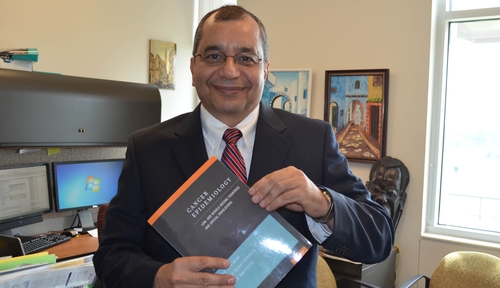The spread of cancer in underdeveloped countries outpaces the rest of the world and has given rise to a need for a specialized approach to research.
“Cancer Epidemiology: Low- and Middle-Income Countries and Special Populations,” which has just been released, is the first book to provide a valuable reference for students, researchers and clinicians of international cancer epidemiologic research.
Amr Soliman, M.D., Ph.D., professor and chairman of epidemiology in UNMC’s College of Public Health, wrote five chapters and was the primary editor of the book.
“Most international researchers fail because they don’t have the research skills, education, experience and the cultural sensitivity necessary to conduct studies in foreign countries,” Dr. Soliman said. “It’s necessary for all aspects of research – from questionnaire design to intervention development.”
The World Health Organization (WHO) predicts that there will be 16 million new cancer cases per year in 2020, and that 70 percent of these cases will be diagnosed in low- and middle-income countries.
According to WHO, in 2008 64 percent of global cancer deaths — and 56 percent of cancer cases — were registered in Africa, Asia and Latin America.
“So while cancer is unquestionably a global burden, its reach in the developing world points to the need for specialized study of cancer in these countries,” Dr. Soliman said. “Right now, cervical cancer has outpaced HIV-AIDS as the new epidemic in Africa.”
The five sections in the book review the current state of cancer epidemiologic research and training, required infrastructure, methodological principles, examples of application in low- and middle-income countries and recommendations for the future.
“We need trained researchers in the collection of raw data — cancer incidence, environmental and occupational exposures, types of vaccines available, barriers to screening, outcomes to survival and cancer survival and control,” Dr. Soliman said.
Dr. Soliman directs the Cancer Epidemiology of Education in Specific Populations program, now in its seventh year. It is funded by a $1.5 million training grant from the National Cancer Institute. The two-year research training program for 10 funded students was transferred last fall from the University of Michigan School of Public Health, Ann Arbor.
The program provides instruction and then practical experience with low- and middle-income populations in the United States and abroad.
